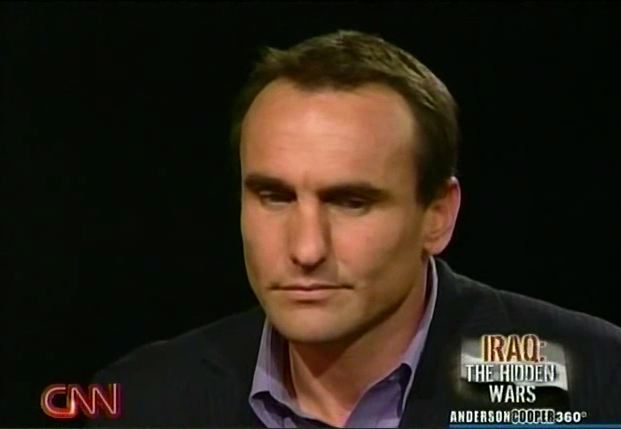
IRAQ: THE HIDDEN WARS
Because of the length of this special, I have uploaded it both as a single clip
and as six individual clips. Links and times are below,
with the transcript separated by segment.
FULL PROGRAM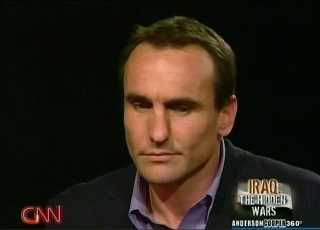
Click photo to play
Length: 42:15
BY SEGMENT: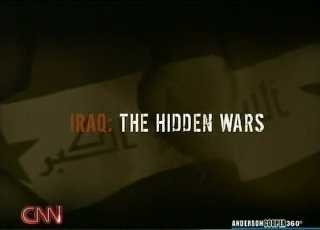
Click photo to play
Length: 7:21
ANDERSON COOPER, CNN ANCHOR: More headaches for President Bush even as members of the 82nd Airborne make their way into Iraq. New questions about his plan to send them there.
At Senate confirmation hearings today, the man Mr. Bush named to run Central Command and oversee the war withheld judgment on more troops. "I don't know," were Admiral Fallon's exact words. And from GOP Senator Arlen Specter, a warning for the president.
(BEGIN VIDEO CLIP)
SEN. ARLEN SPECTER (R), PENNSYLVANIA: The president repeatedly makes reference to the fact that he is the decider. I would suggest and suggest respectfully to the president that he is not the sole decider, that the decider is a shared and joint responsibility.
(END VIDEO CLIP)
COOPER: Well, meantime in Baghdad and all across Iraq today, another surge of sectarian violence, most of it aimed at Iraqi Shias, marking Ashura, the holiest period on the Shia calendar. At least 50 people were killed.
That is the backdrop -- bloody, confusing, potentially a no-win situation.
CNN's Michael Ware has spent years in Iraq watching things get to this point that he described as four separate wars unfolding at once.
Recently, he spent a rare few days here in New York and sat down with me for a remarkable conversation.
(BEGIN VIDEOTAPE)
COOPER: So, where is the war right now?
MICHAEL WARE, CNN BAGHDAD CORRESPONDENT: Well, it's in -- as the American commanders call it, a dire, but not yet hopeless state. However, it's hard to see how the war is not in an intractable position.
I mean, there's a lot of activity, but there's no progress, either politically, economically or militarily. We're now entering the fifth year of this war. We've seen more than 3,000 American combat deaths and non-hostile deaths. And we've seen more than 20,000 American wounded. Yet what's been achieved?
I mean, is there a true democratic state either in existence or even emerging?
COOPER: Supporters of the war -- Vice President Cheney says that there are successes and they point to the democratic elections that have been held.
WARE: Right. On the surface, yes, they are successes. There's one of the most progressive constitutions in the Arab world in place in Iraq.
But what's the reality? What's the effect? What's it like for the ordinary Iraqi on the street? And their common retort is, "if this is democracy, then we'd rather have the old ways. I mean, this is your freedom?" I mean, look at their lives. I mean, look at how their daily life is wracked with violence. People are being ethnically cleansed from their neighborhoods. You can't send your children to school for fear of crossing ethnic lines. Bodies are showing up in the streets every day. Death squads are roaming the streets at night.
And for Sunnis, these death squads come in the dead of night in legitimate police or army uniforms showing legitimate identification saying, "you must come with us."
COOPER: So the focus is on Baghdad. Is there a cost that will be paid because of that?
WARE: Absolutely. This focus on Baghdad that we've seen evolve in American strategy over the last 12 to 18 months does not come without a price.
While you're pouring all your attentions, all the thrust of your attentions militarily, politically and economically into the capital, the question is what's happening beyond the city?
So while you focus on Baghdad, part of the cost of that is that over here in Anbar Province, that's suffering for want of troops and a real thrust of effort, al Qaeda, which the Marines themselves say more or less politically owns this part of the country, is becoming stronger. Focusing on Baghdad has given al Qaeda the oxygen it has needed to grow.
COOPER: They are planning on sending several thousand more troops to...
WARE: Four thousand more troops to al-Anbar. But like the country overall, again, that's just a drop in the bucket.
Part of the other price to be paid for the focus on Baghdad is that here in the south, you have entrenched Iranian influence, as we see through the control of the Iraqi militias. By and large, the militias own the south. And what that means is that Iran's influence is greatest there. Now, whilst it is a much more stable place in the south and American commanders are quick to point that the levels of violence there are minimal, the reality is, as Sunnis often charge, is that that veneer of stability has been achieved through an accommodation with the militias and essentially with Iran.
You let them control it, you give power to them. And on the surface, it will look good.
COOPER: So we talked about this new strategy. You say, though, there's really not that much new about it.
WARE: Now, what we're seeing is the old becoming new again. I mean, in many ways, this is again staying the course. There's no radical shift in strategy.
I mean, let's, for example, look at the troop numbers. We're seeing what they're calling a surge. Now, that doesn't suggest in any way a complete overhaul of strategy. It's talking about an enhancement.
So 21,500 troops, given the state of the problem, the size of the country and the population, by and large is nothing. That's still a drop in the bucket. And what we're seeing in terms of the actual tactics to be now employed in the capital Baghdad -- sprinkling U.S. troops throughout neighborhoods throughout the city -- again is not new. It may be a development for the capital, but we've seen this particular strategy evolve in Iraq with American forces.
We first saw it in the northern border town of Tal Afar, an al Qaeda gateway. We've since seen it adopted and enhanced in the western city of Ramadi, the true al Qaeda national headquarters. And we're now seeing it being supplanted in Baghdad.
So in many ways, this is something that we've seen coming to life again and being described as a new strategy, as President Bush called it in the State of the Union address.
(END VIDEOTAPE)
COOPER: We'll have more from Michael Ware coming up on each of the four wars that he says are now being fought in Iraq.
Plus, Michael Ware's brush with death.
(BEGIN VIDEO CLIP)
COOPER (voice-over): Covering the story is dangerous enough, without nearly becoming the story.
WARE: These men intercepted my vehicle, and with grenades with the pins pulled so that they were live, hauled me from the car. And with my own video camera, they were preparing to film my execution.
(END VIDEO CLIP) COOPER: The story Michael Ware lived to tell. His insider's view of the war, when this special edition of 360, "Iraq: The Hidden Wars," continues.
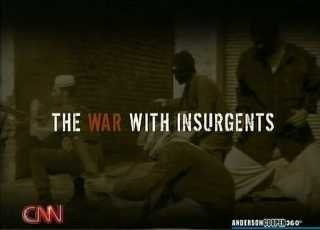
Click photo to play
Length: 8:51
COOPER: CNN's Michael Ware describes the war in Iraq as four wars happening at once: one with the Sunni insurgency, one with al Qaeda, one a civil war, and the last one the unstated war, the covert war, with Iran. Tonight, a look at all four. First, the Sunni war.
(BEGIN VIDEOTAPE)
COOPER (on camera): When you talk about the war in Iraq, you're actually talking about many different wars.
The first war, the war of the Sunni insurgents, how did that start?
WARE: What we saw almost from the beginning is that elements from the military and from the Baath party and from within the Sunni community begin the insurgency.
What started as small, ad hoc, without coordination, eventually emerged as a structured and extremely effective guerrilla fight.
Now, these are the people who originally administration figures were calling dead-enders and criminal elements. But we've now seen that that's not the case. The Sunni insurgency is by and large the war that America went there to fight.
COOPER: But the U.S. really hadn't expected there to be an insurgency at all?
WARE: By and large, no. They expected a much warmer reception. But with the disbandment of the military, with the lack of economic opportunity and with what was perceived to be a heavy focus on the Shia, all these former generals and colonels and officers and foot soldiers felt that they were left with no other choice.
Plus, one thing that's been significantly underestimated from the beginning is the Iraqi sense of nationalism, particularly among the Sunnis. Or their sense of honor.
These men were just sent home in what they felt was dishonor. They were no longer required and they were disempowered.
Now, the way it began is that essentially small groups would just pick up arms and take potshots at passing American convoys. But eventually one group started talking to another group. Then they'd start to coordinate, sharing weapons, sharing intelligence. Then command and control structures began to emerge.
COOPER: Did they want Saddam back in power?
WARE: These soldiers, these generals, were not fighting for a return of Saddam at all.
Indeed, the day Saddam was captured, in December 2003, and word leaked the next morning, I was with Sunni insurgents. Every one of them to a man said, "this in no way affects what we're doing. We're not fighting for Saddam.
"Whilst this may be a symbolic body blow, this did not strike at the heart of the insurgency."
That's what they said the day he was captured. And in the years since, we've seen that borne out.
COOPER: So these are men who at least initially supported al Qaeda, who were...
WARE: Absolutely not. In fact, in many ways they were opposed to if not al Qaeda, at least the idea of al Qaeda. And we certainly saw through the early years of the war and, to a degree, continuing now, great friction between these elements of America's enemies.
COOPER: So when did this first war, these Sunni insurgents start to become more radicalized?
WARE: As we saw strains put on the insurgents' flow of finances and funding, we saw a growth in the power and influence of al Qaeda and other Islamists.
And also, don't forget, what we now see as a civil war has pushed people on both sides to the extremes. So we're now seeing nationalists being herded towards al Qaeda.
More and more we started seeing foreign fighters appearing in Haifa Street, to the point where by the end, Zarqawi's organization, which later became officially al Qaeda, was able to display its banners along the length of Haifa Street, to take ownership of it over the Iraqi nationalists.
COOPER: Al Qaeda in Iraq could actually put its banners on a street in Baghdad, in central Baghdad?
WARE: Yes, they did. And this was a symbolic passing of power here in the center of the capital.
Now, I personally experienced this. Just days after a blazing battle with U.S. forces that left a Bradley armored fighting vehicle in flames, Zarqawi supporters were on top of it waving his flags.
What happened is al Qaeda said, "well, we now own this." So I went in there to document this, to see if it was true and to try and show this.
COOPER: Are you nuts?
WARE: Well...
COOPER: Do you ever ask yourself that?
WARE: Yes, often, actually. But this is -- this is...
COOPER: I mean, that's a dangerous thing to do.
WARE: It is an extremely difficult thing to do. But, I mean, this is a part of the nature of this, like every war. The fog of war. What's true and what's not. There's so much that we're told by all sides. I mean, this is one of the universal features of this war as in all others, is that everybody lies.
But I went in there and sure enough, I found the banners. Sure enough, lining the streets were Zarqawi's fighters, these men who soon became fully fledged al Qaeda.
Now, what happened is that in the end, these men intercepted my vehicle and with grenades with the pins pulled so that they were live, hauled me from the car, and with my own video camera, they were preparing to film my execution.
So as far as we're aware, after that day on Haifa Street, I'm the only Westerner that we know of who's been in the control of Zarqawi's organization, al Qaeda, and to have lived to tell the tale.
COOPER: How did you get out of there?
WARE: I was in a vehicle with a mid-ranking Iraqi insurgent commander who'd told me of Zarqawi's takeover, essentially complained about it. And I said, well, I need to see this. So he took me in there to show me, "that these radicals, these foreign Islamists, have taken our territory."
When the foreign radical Islamists, essentially who became al Qaeda, dragged me from the car, this man was left to negotiate for my life. And this is where we see the difference come into play.
The Zarqawi fighters wanted to execute the Westerner. As they said, "you bring a Westerner in here and you expect us to let him leave alive? Well, no, it doesn't work like that."
So even those these Islamists, at that time, had the upper hand in Haifa Street, they couldn't discount the local fighters. And essentially, it came down to the local Iraqi insurgent saying, "OK, you can kill this foreigner, but know that that means we go to war, because he has come here at our invitation. And for you to kill him is essentially an insult to us."
And as much as these foreign fighters wanted to kill me, at the end of the day, they knew that practically they couldn't, because they could not afford to have this local fight. And it was through gritted teeth that they essentially gave me back to the Iraqi insurgents, who then took me out.
COOPER: What was that feeling like when you realized you were going to live?
WARE: Whew. It took a long time before it actually dawned on me. I spent many of the following days in my room. I found it very difficult to leave the safety and comfort of my bedroom. It took some time for me to regather myself and to return to the streets. But, in fact, just days later, I did return to this very place.
COOPER: You went back to Haifa Street?
WARE: I went back to Haifa Street. Not to precisely the same area, but yes, I did go probing back into this area during some fighting.
COOPER: That is when the second war in Iraq begins. And we'll talk about that, the rise of al Qaeda and the man who changed it all, Abu Musab al-Zarqawi. We'll be right back.
(END VIDEOTAPE)
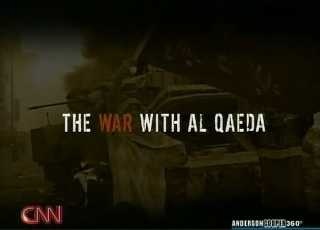
Click photo to play
Length: 7:16
COOPER: Before the break, CNN's Michael Ware was describing his near-execution by al Qaeda insurgents in Iraq. By the time Michael crossed paths with those insurgents, al Qaeda in Iraq -- a Sunni group -- had a firm foothold in the majority Shia country. The man responsible for that, as Michael touched on, is this man, Abu Musab al-Zarqawi.
He was killed last June in a coalition air strike near Baqubah. U.S. officials say he was behind dozens of terrorist attacks in Iraq, including the beheadings of several Americans and other foreign hostages. He died a hero among Muslim extremists.
And as Michael explained to me, the civil war that's engulfed Iraq, may be his biggest legacy.
(BEGIN VIDEOTAPE)
COOPER: The second war in Iraq, the rise of al Qaeda, the growth of the importance of Abu Musab al-Zarqawi.
May 1st, 2003, President Bush stands on that aircraft carrier, mission accomplished. What's actually happening on the ground?
WARE: Okay, this is the story of al Qaeda in Iraq. If you remember, before the invasion, there was what the administration says, "the presence of an al Qaeda element in the country." Now, that had nothing to do with Saddam. What they were talking about was this group called Ansar al-Islam, that was holed up here in the north, in the Kurdish region.
So what we saw even then during the invasion was two wars, the war against Saddam's regime and a much, much smaller attack against an al Qaeda element in the north.
Now, I was there in the north. I was in the battle with U.S. Green Berets and Kurdish Peshmerga fighters, essentially the Kurdish militia that the Green Berets used to go into this mountain stronghold of this al Qaeda-linked group and drive them out.
I was there with the Green Berets as we all watched these fighters walk over the mountains into the safety of Iran. I was even there as a Green Beret was reporting back on his radio, "they're exfilling, they're retreating, they're escaping to Iran."
So while the administration is saying, "here's al Qaeda and it's been wiped out," no, the body of this group had been preserved. And we've since seen them and many others reemerge.
COOPER: And was Abu Musab al-Zarqawi there?
WARE: According to the administration, and much has emerged since, Zarqawi was involved with this group.
Now, what you need to remember is, after the success of the invasion of Afghanistan and al Qaeda was driven out of its sanctuary, its base from which it launched September 11 attacks and many other things, we saw now an organization put under great stress. It had to retreat into the mountains of Waziristan and Pakistan and it had to disperse.
So what we saw for Zarqawi and what we've now seen for al Qaeda more broadly, is that the invasion of Iraq gave them the next platform that they'd been looking for.
So in many ways, the invasion played directly into the hands of al Qaeda.
COOPER: It gave them a focus, it gave them a place to go to, it gave them a battle to join.
WARE: It gave them a battle. It brought the enemy -- America -- to them.
The American war in Iraq made Zarqawi. It turned him from a relative nobody into one of the superstars of global jihad, of global Islamic extremism.
COOPER: He did that through these propaganda tapes, through these tapes of executions of kidnap victims...
WARE: Through a whole range of things. That was just one dimension of Zarqawi's vision, Zarqawi's strategy.
COOPER: What did he want? What was his plan?
WARE: Zarqawi's plan -- as we know from a letter he wrote to Osama bin Laden that was intercepted and since released by U.S. forces -- what he wanted to do was use Iraq as the new platform to fight this global war. He wanted to use Iraq, much as we saw Afghanistan in the 1980s during the Soviet occupation, to create a whole new generation of al Qaeda and radical Islamic fighters. And that's precisely what he did.
At the core of it, apart from the fight against the Americans, what Zarqawi wanted to do was to strike up a war between the Sunni sect of Islam and the Shia sect of Islam. He believed it was through this that his and al Qaeda's Sunni branch of Islam would awake from its slumber and rise up to defend itself and eventually conquer all before it. And it was through Iraq that he saw that they would do that.
COOPER: It's interesting because we in the West often view the battle as a battle between the United States or the West and this radical sect of Islam.
In fact, this radical sect of Islam, they want it to be viewed as that because they want to be seen as the champions of Muslims around the world, when in fact the people they are really fighting against ultimately are other Muslims. The people who they oppose are people who they believe are not Islamic enough.
WARE: From the Zarqawi school of thought, there's many battles to be fought. And it's this fight against this other branch of Islam that is one of the vehicles that will elevate Islam.
What al Qaeda in Iraq has now done is declared this western part of the country an Islamic state. Within this Islamic state, they intend to rule by Sharia law, pure Islamic law.
But we're seeing them create a ministry of information. They're putting together essentially a shadow government that will have a cabinet and different ministries to administer the people who fall within this state.
But what we see right now is that al Qaeda feels that coming into our fifth year of this war, that it is in a position, that it is doing so well that it can dare declare a part of American-occupied Iraq an al Qaeda Islamic state, a country within the American occupation.
COOPER: When we come back, we'll talk about the third war in Iraq, the civil war. That's when we return.
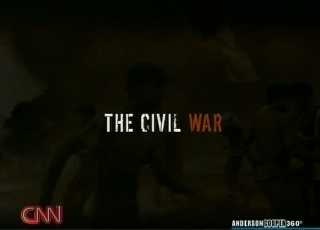
Click photo to play
Length: 7:00
COOPER: This third war you talk about, this civil war in Iraq really is a victory for Abu Musab al-Zarqawi. It's what he wanted all along.
WARE: Absolutely. As he spelled out from the very, very beginning, what he believed was that if we attack the Shia, they will be forced to respond. Then this sleeping giant, the Sunni sect of Islam, will be forced to rise up. He believed that was the key to the way forward.
So essentially, he created the civil war that not only now exists in Iraq, but is dominating the political and military landscape. This is Zarqawi's legacy.
COOPER: And nowhere do we see that more than in Baghdad itself, the sectarian violence?
WARE: Baghdad is the central battleground for the civil war. Now, we see U.S. military commanders herald the fact that by and large, the sectarian violence is only limited to the capital and 30 miles around it. Well, that's all it would ever be. That in itself is no success and that is no indication of the nature or size or implication of the civil war.
Why? Because in the rest of the country, the sects essentially live alone. It's only in the melting pot of Baghdad that we see, in a very concentrated way, the sects coming together.
So Baghdad was always going to be the fault line in any such war.
COOPER: In Baghdad, there is now the situation of different groups controlling different territory. You have Muqtada al-Sadr in Sadr City with his own army, essentially. What is the sectarian civil war look like?
WARE: Well, there's no clear front line because everything is so mixed. But we are starting to see divisions occur.
Essentially, the capital of Iraq is divided by a river. And as a rough, very rough rule of thumb, what we're seeing emerge is that one side is dominated by the Shia and the other side is increasingly becoming dominated by the opposing Sunni. This civil war, this sectarian bloodletting of neighbor against neighbor is happening everywhere -- in the streets, in the neighborhoods.
I mean, we're seeing at least 30, 40, 50 bodies showing up on the streets of this city every morning.
COOPER: And it's not just bodies that have been shot. I mean, these are people who have drills -- holes drilled into their head with power tools.
WARE: For no reason. It's not to extract information. It's simply to make their death as brutal and as horrific as possible.
COOPER: And these death squads, are some of them controlled by members of the Iraqi government?
WARE: Absolutely. Absolutely. Many of these death squads, if not coming from within the ranks of the government or the ranks of its police, are certainly associated with them or attached with them, are facilitated by elements of the government. Simply, they could not exist without the active or at least tacit support of this government.
COOPER: When you're stopped at a roadblock by Iraqi police officers, do you open your doors? Do you roll down your windows?
WARE: Like ordinary Iraqis, when you turn a corner on a street in the capital of Baghdad and suddenly you're confronted by a police or army checkpoint, you have no idea who these men really are. They may be in legitimate police uniforms, legitimate police vehicles, legitimate police identification. But they could quite simply be a death squad. So everyone who moves in this city is rolling the dice every time they set foot outside of their home. And, indeed, for many people, even sitting in their homes is not safe because police-run death squads or Sunni extremist death squads can enter homes and drag people out. Nowhere is safe. And you don't know who anyone is.
COOPER: I've been to Iraq for all the elections. The administration keeps pointing to these elections as a sign of success. Have the elections had any impact to lessen the violence? Or have they...
WARE: Not in the slightest. Not in the slightest. In fact, one can argue, as the Sunnis do, is that it's the democratic process that has helped fuel this sectarian conflict.
The Shia population of Iraq is in the majority. So, clearly, in the democratic elections, it's they who dominated. It's they who won most of the seats in the parliament. So it's they who are able to have the whip hand in forming the government.
Essentially, this is a Shia-led government. To the Sunnis, they see this as America entrenching the power of the Shia, and clearly, its main supporter, Iran.
So, to them, this was a battle line. This is one of the reasons that they say they've had to take up arms, not just against the government and the death squads, but also against the Americans.
So this is what we've seen. Ordinary Sunni Iraqis who have sat on the fence or who have just sat and waited for the prosperity and safety that we promised them to be delivered drift towards al Qaeda and its affiliates. They've got to the point where they feel they have no other choice.
And the true winners of the war so far -- of the invasion and the occupation -- at the end of the day, are the Islamic extremists on both sides represented by al Qaeda on one hand and ultimately Iran on the other. They're the winners so far.
COOPER: And when we come back, we'll talk about Iran and what is really -- Michael refers to as the fourth war, the proxy war, the covert war against Iran. We'll talk about that when we come back.
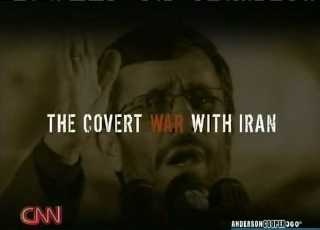
Click photo to play
Length: 4:58
COOPER: The fourth war that's going on in Iraq, the proxy war against Iran, how did Iran get involved?
WARE: Iran's been involved from the very, very beginning. Don't forget, you know, Iran and Iraq share a land border. There's many tribes and families that live on both sides of this border.
In the '80s, Saddam launched a vicious eight-year war against Iran. So Iran very much has legitimate national security interests in terms of Iraq. And we've seen Iran aggressively pursue those interests. What happened during the invasion, as U.S. and British forces advanced from Kuwait to the north, clearing Saddam's forces as they went, we saw essentially an Iranian-backed invasion at the same time that filled the vacuum that was left behind. It was extremely well organized and coordinated.
And, in fact, the irony is we saw Iran use the very same successful tactic that the American Green Berets used in Afghanistan to win against the Taliban and al Qaeda against U.S. interests in Iraq.
COOPER: You mean covert forces?
WARE: Very much.
COOPER: Small numbers.
WARE: During Saddam's regime, hundreds of thousands of Iraqi Shia fled to Iran. Iran saw many of these people not only as brethren and refugees to be protected, but as an asset. Hundreds, thousands, tens of thousands of these Iraqi Shia who were in Iran were mobilized and used by the Iranians within its armed forces.
COOPER: What would they do? They went in with money? They went in with arms?
WARE: With everything. What they did is, in the chaos and the vacuum of power that was left behind the advancing coalition forces, they took power. They took the governor's office, the police chief's office, the Baath party headquarters, and they never really left.
And, indeed, what the British found, as we learned from the British army report into the execution killing of six of its military police in 2003 by Iranian-backed Iraqi militias, is that when they arrived in one of these major border provinces here, they found that the militias were already so strong that the report said the British had a choice, to either confront them or to accommodate them.
And the report says that for the sake of stability and security, they felt they had no other choice but to accommodate these militias. So that entrenched the militias in power.
COOPER: And they have given the militias of -- like, for instance, Muqtada al-Sadr, they have given them training, they have given them arms and money?
WARE: Yeah. What we saw with many of these networks and these organizations that were in Iran is that they were kept in place and they moved into Iraq. And with them came what's essentially Iranian green beret advisers. You had Iranian form of CIA advisers. All coming with them. To guide, direct, to channel them.
And even elements within Iraq, like Muqtada al-Sadr, the rebel anti-American cleric and his Mahdi army militia, Muqtada and his militia were very different to these others. They never fled Iraq. They didn't go into Iran. They remained in Iraq. Now, in the beginning, that was a great rallying cry for Muqtada. He was able to represent himself as a true nationalist -- "I stayed while these people left. I suffered with you." That was very persuasive. That drew a lot of people to his cause.
But over time, we've seen Iran not only court Muqtada, but then militarily support him. We've seen a flow of money, a flow of arms and a flow of training back and forth.
COOPER: When we come back, we're going to take a look at what the options are now for the United States and the region. Where do we go from here. We'll be right back.
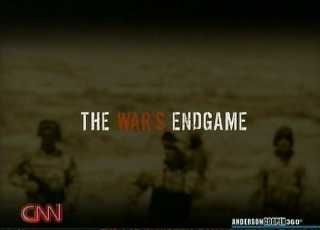
Click photo to play
Length: 6:47
COOPER: We talked about the four wars that exist within the war in Iraq. We've talked about the current U.S. strategy. What are the options?
WARE: Well, from the way things have emerged -- even though U.S. commanders say the situation is dire, it's not hopeless -- it's very hard to see any kind of alternative that is anything but ugly and difficult.
COOPER: The new strategy, flooding troops into Baghdad, several thousand troops into al-Anbar Province, they say that's basically the final shot that the U.S. has, according to many Republicans and Democrats.
WARE: It may very well be. And if that's the case, then things are only about to become worse. There's very few positive outcomes that one can see emerging from Iraq at this point.
Iran and its allies and its proxies are so strong and so entrenched, many people say that once that genie was out of the bottle, it can't be put back.
Al Qaeda has been developing such a stronghold within Iraq that it never had under Saddam, that people say that can never be rooted out, certainly not entirely.
So what we've seen as a direct result of the invasion and the war is that two of America's greatest enemies have become emboldened, and indeed, more powerful, stronger than they were before the war.
And under any scenario, military or political, it's almost impossible to see how that can be rolled back.
COOPER: Some Democrats are calling for a cap on U.S. troops -- also some Republicans -- or some sort of phased withdrawal. What would happen if the U.S. did begin to withdraw? Is the Iraqi government capable of ruling, of providing security for its people in Baghdad and the rest of the country?
WARE: Not at all. It's widely acknowledged by the U.S. military and the administration and analysts and anyone in Iraq that if America were to pull out, then there would be a nightmare almost beyond imagination that would unfold in Iraq.
COOPER: There are those, though, who support some sort of phased withdrawal or redeployment, saying this will force the Iraqi government to stand up, to get their act together faster.
WARE: It's impossible. It's impossible. The American administration in Iraq has done everything it can to force the Iraqi government to stand up. But at the end of the day, what is the Iraqi government? The Iraqi government is, by and large, just an alliance or a conglomeration of militia forces.
The currency of political power in Iraq to this very day, under this new democracy is still found at the end of the barrel of a gun. You have no political stake unless you have a militia.
So that's why we have this Prime Minister Nouri al-Maliki, a man who himself does not have a militia, in such a dire political situation.
COOPER: So if you're saying some sort of withdrawal or phased redeployment could lead to -- would lead to blood shed, you say the current strategy, there's nothing really all that new about it, do you have an answer?
WARE: Well, there's a few things that people suggest, none of which are terribly attractive to the people of Iraq, nor to the people of the West. I mean, it just doesn't seem that there's any road forward that does not involve the spilling of so much innocent blood or the abandonment of so many of the principles that we of the West hold dear.
COOPER: Some talk about a kind of a partition, either a very -- an actual partition or some sort of soft partition.
WARE: Partition of any kind, again, impacts directly on the interests of all these regional players. And most argue that should you partition, that again will force these regional players to increase their negative activities in Iraq.
For example, we would see the Arab states feeling themselves forced to actively support Sunni insurgencies, and indeed, al Qaeda. So partitioning in many ways is not seen as a solution.
COOPER: The new head of the Defense Department has suggested that by March, the U.S. should have some indication whether the al-Maliki government is actually living up to its promises. Lieutenant General Petraeus seems to be talking about a longer timeline to find out whether this -- what they are calling a new strategy, is actually going to work. Do you have a sense of how much time it may take to see whether or not this will work?
WARE: Do we need more time to know if this strategy will work? In my view, no, not at all. It's clear and abundant now that the strategy as it stands is not working and will not work. It's strengthening America's enemies. The American military presence in Iraq now, what will become 160,000 troops, is still in many ways not enough to really secure the country, to make people feel safe, to defeat al Qaeda and to rebuff Iranian interests. That has not changed.
COOPER: So militarily, if there's not a solution, is there possibly a political solution if all the actors involved or the major actors involved had a change of heart, had a change of mind or suddenly became willing to make some sort of accommodation?
WARE: It's in no one's interests to change their minds. I mean, many of the players that the U.S. is either relying upon or being forced to confront or deal with in the Iraqi government, their interests are not aligned with American interests. So no, there's no incentive for them to change. Why should they?
COOPER: So the wars within the war continue?
WARE: The wars within the war continue.
COOPER: Michael Ware, thanks.
WARE: Thank you.
(END VIDEOTAPE)
